- Home
- Jay Bonansinga
The Sleep Police Page 10
The Sleep Police Read online
Page 10
Through the door: “Yeah, Bambi, it’s me.”
“How ya doin’, D?”
“Alright, I guess. You know. Things could always be better.”
Frank sniffed back his tears and tried to focus. “I’m gonna open the door, D.”
“Okay.”
“I’m opening the door now, D,” Frank said, raising the shotgun, aiming it at the gap, hands trembling wildly. He unlatched the deadbolt.
Then he cracked the door a few inches.
Outside, in the hallway, the three cops stiffened at the sight of the shotgun, looking like cats arching their backs: Deets frozen, wide-eyed, the two uniforms behind him instinctively reaching for their Smith & Wessons.
Deets shot his hand up. “It’s okay, we’re all friends here. It’s okay.”
“How’s it going, D?”
“No complaints, Bambi, you know how it is.”
“Who’d listen, right?”
“Exactly.”
The cop named Foley suddenly drew his gun.
Frank yanked the pump back with a loud clang.
“Put it away, Foley,” Deets said, his gaze riveted to the barrel of Frank’s 870.
Foley started to say, “But—”
“PUT THE GODDAMN PIECE AWAY, FOLEY!!”
The younger uniform reluctantly holstered his gun. The heat in the hallway was tremendous. Faces were already glistening with sweat and tension.
“Sorry about all this, D,” Frank said finally.
“Don’t worry about it, Bambi.”
“I’m not doing too good,” Frank said.
Deets nodded. “I know.”
Frank swallowed a lump of grief. “You’re here to tell me about my brother, right?”
Deets chewed the inside of his cheek for a moment. “I’m still a little unclear on what’s been going on.”
“You and me both, D,” Frank said.
“They tell me I’m supposed to take you down,” Deets said.
“That’s what I figured.”
“I’m sorry, Bambi.”
Frank looked at him, tried to keep the tears at bay. “You got something solid off my brother’s scene?”
Deets nodded. “Yeah, actually, we got a couple of things. Some more fibers, some handwriting.”
“Handwriting?”
Deets looked ill. He sighed. “Stuff written in blood. On the walls.”
Frank looked at him. “On the walls?”
“Yeah.”
Frank flashed back to the smears of blood in the video, or perhaps he was flashing back to an actual memory. He swallowed hard. “You mind telling me what it said, D?”
“Something about sleep.”
“Sleep?”
“Yeah, something about the ‘sleep police.’ It was in your handwriting, Bambi.”
Cold liquid streamed down Frank’s spine. “Crime lab guys figured that out at the scene?”
“I recognized it,” Deets said softly.
Frank nodded.
“Got all kinds of prints, too,” Deets went on. “Did a rapid check at the scene, just to make sure. Got a hundred and eleven matches.”
“Okay, D, I see what you’re up against,” Frank said.
One of the uniforms put his hand on his gun.
Frank raised the shotgun.
Deets put a hand up. “We’re just talking here, fellas, no need to get ornery over this thing.”
“Sorry,” the uniform muttered.
“I can’t let it go down like this, guys,” Frank said. “I’m real sorry.”
“What do you need, Frank?” Deets asked.
“It’s just—” Frank paused, wiping his tears with his shoulder.
“You name it, Bambi, we’ll do what we can.”
“I appreciate it, D, it’s just—” Another pause.
“We’re here for ya.”
“Okay. Look. Um...”
Pause.
Deets was licking his lips thoughtfully, sweat shimmering on his forehead. “Whatever it is, Frank, we’ll do our best to get it for you.”
“Okay, here’s the thing,” Frank said. “Would it be okay if you guys waited here for one second? I need to go get something, and I’ll be right back. Okay?”
There was a tense pause, as Deets exchanged glances with the other cops.
Frank watched them. “I won’t do anything crazy, guys, I promise.”
After a moment, Deets nodded. “Go ahead, Bambi, we’ll be waiting right here.”
CHAPTER SIXTEEN
Frank shuffling backward into the kitchen, keeping the shotgun raised and aimed at the front door.
Frantically scooping the severed ear off the counter with his left hand, gripping the Remington with his right, he moved as swiftly as possible. He grabbed a towel and laid the ear in it. Then he tore open the freezer and grabbed a few ice cubes, then wrapped the ice in the towel.
He was in some kind of a horrible zone. Woozy with shock, reeling with rage and terror. Maybe he wasn’t thinking clearly, and maybe he was—it didn’t matter anymore. He was long past caring.
He returned to the front door with the bundle tucked under his arm.
Out in the hallway, Deets and the uniforms were drenched in sweat and losing their patience.
“Talk to me, Bambi,” Deets said.
“I need you to do two things for me, D, if it’s all right,” Frank said, his eyes welling.
“Shoot.”
Frank handed the bundle to Deets. “If you don’t mind, I’d like you to return this to my brother’s body.”
Deets looked at the bundle quizzically.
Frank explained: “It’s my brother’s ear.”
A pause as the cops stared.
“If it’s okay,” Frank went on, “I’d like you to give it to the coroner so he can reattach it.”
There was another pause, as the cops looked at the bundle and then at Frank.
“What’s the second thing, Bambi?” Deets said.
“The second thing,” Frank said, his voice cracking, “is that I’d like to see Pope.”
Deets nodded. “We’ll have him waiting at the Twenty-fourth when we get there.”
“Um, actually, D, what I need is, I need to see Dr. Pope here.”
“Here?”
“That’s the way I’d really like to do it.”
Deets looked at him. “You want us to bring him here?”
Frank nodded, holding the shotgun. “If it wouldn’t be too much of a problem.”
Deets breathed in a long, pained breath. He glanced at the other cops. Foley, the younger one, was getting very antsy. He shook his head in disgust and whispered something like, “Jesus Christ...”
“PLEASE! PLEASE!” Frank was aiming the shotgun at the younger cop, screaming at the top of his lungs, “I’M ASKING YOU GUYS TO DO THIS ONE THING FOR ME! THIS ONE THING! PLEASE—!!”
“Okay, Bambi, okay, okay, okay, easy, it’s all right,” Deets was saying, holding his hands up in surrender.
A pause. Frank was breathing hard, his finger on the trigger.
“Everybody just calm down,” Deets said.
“I’m sorry, D,” Frank said, cringing at the bolt of pain jabbing up his spine.
Another pause.
“Okay, everybody, let’s just take this one step at a time,” Deets said.
“I promise you, D, if you make this happen I will make things right.”
Deets pursed his lips, thinking, agonizing. Finally he said, “Okay, here’s what we’ll do. We’ll have to post uniforms in front and in back.”
“I understand,” Frank said.
“And we’ll have to do this quickly, before IAB or Media catches wind of it.”
“I agree, D, that’s absolutely right,” Frank said, wiping another tear off his face.
“Okay, Bambi, here’s the deal: You stay put, and I go try to track down the good doctor.”
“I really do appreciate it, D.”
Deets looked at Frank. “You gotta promise me though.
Some reason I can’t find Pope, or he’s indisposed, or whatever—”
“I’ll come peacefully, D, I swear to God.”
Deets let out a long, pained sigh, nodded at the other two cops, then started down the corridor toward the stairs.
Frank watched them leave, then shut his door and shoved the deadbolt home.
He went back into the living room, pulled an armchair across the shards of broken videocassette and sat down facing the front door. He kept the shotgun across his lap, his hand clutching the grip, ready for action.
Then he began composing a speech in his mind.
It was Henry Pope’s day off, and when Deets tried to reach the doctor at home, all he got was the doctor’s answering service. So Deets hopped in his Crown Victoria and made a mad haul up Sheridan Road.
By the time Deets arrived in Kenilworth—Pope’s neighborhood—word had spread across the entire CPD that one of their own detectives had blown a gasket and was the primary suspect in a series of high-profile, unsolved killings. It had started in the County Coroner’s lab, after Deets had dropped off the severed ear, and it had spread like a house on fire. Deets’s cell phone had rung at least a half a dozen times with frantic inquiries from Armanetti, Krimm, Internal Affairs, and even people from Mayor Daily’s office. His radio was boiling with frenzied dispatches, and the Media division was going into overdrive, trying to deal with the so-called “stand-off” that was occurring at this very moment at Detective Janus’s apartment building. It was all making Deets’s ulcer flare up with a vengeance.
And that’s why it was especially incongruous to find Henry Pope at home that day, in the study of his old Victorian painted lady, dozing with his half-glasses on the end of his nose, and a book tented over his pot belly. He looked so peaceful there, like a retired grandfather, slumped in his Heppelwhite armchair, a glass of ice tea and a box of Nilla Wafers next to him.
“Doc?! Hello?!” Deets was standing outside the study’s window, gazing through leaded glass at the slumbering doctor. A moment ago, Deets had tried unsuccessfully to get somebody to answer the front doorbell, and now he was knee-deep in impatiens and daffodils, frantically tapping on the windowpane.
Through the glass, Pope was stirring.
“Doc! Doc!” Deets tapping madly on the glass.
“Who is it?” Pope mumbled, blinking, coming awake with a start. All around him were countless framed photographs of grandkids. Little porcelain Hummels of children and cherubs, and bronze figurines of babies.
“It’s Sully Deets, Doc! CPD! District Twenty-four!” Deets was waving outside the window like an idiot.
The old man struggled out of his chair, groaning, setting his book on the coffee table. “What in God’s name?” he murmured, shuffling over to the window.
“It’s Deets, Doc! Sully Deets!”
“Deets? What the hell are you doing in my window well?” The psychologist was squinting to see through the glass. The sun was glaring.
Deets motioned toward the south, toward the city. “Got a major situation, needs a psych evaluation.”
The old man looked nonplussed. He was still half asleep, blinking fitfully.
“Frank Janus, Doc,” Deets said, glancing at his watch. “Poor guy’s having a meltdown, needs a pro.”
Pope was blinking at the sun. “Greenthal is on call today, Sully.”
“He asked for you, Doc. Come on out, I’ll explain the whole thing on the way.”
The old man frowned. “On the way? On the way where?”
“I’ll explain the whole thing in the car. Come on, Doc. Please. This is a major situation going down here. Frank trusts you. I’m asking you to do this one thing.”
There was a pause. The old man took a deep breath, glancing around his study. Finally, he let out a long, pained sigh and turned back to the window. “Alright, Sully, let me get my other glasses.”
Frank was in his bedroom, trying to rip the floor-length mirror off the back of his door. At the same time, he was clutching the shotgun in his free hand, aiming it at the windows just in case some Tactical guy got heroic.
The mirror wouldn’t budge. It was bracketed to the door with plastic screws, congealed with years of paint and grime. Frank finally gave up and searched the room for a tool. He found a metal shoehorn in his dresser drawer and proceeded to pry the edges of the mirror until the corner broke and the whole thing toppled to the floor.
Miraculously the mirror didn’t shatter; it only cracked down the middle.
Frank picked up the mirror and hauled it out into the living room.
Working quickly, soaked with flop-sweat and fatigue, holding the shotgun under his arm, he propped the mirror against the wall, near the front doorjamb. He angled it so that it was facing the center of the room, where the broken shards of videocassette and ruined television lay scattered on the faded Persian rug. Then Frank took his place in front of the looking glass.
Out in the hallway, more police radios were crackling. Reinforcements had been coming for the past hour, ever since Deets had left. There was a boatload out there in the corridor now— uniforms, tactical people, even a couple of ATF guys. Frank had been watching them arrive every few minutes through his drawn venetian blinds.
The street in front of his place was also buzzing. There were at least a dozen beat cars down there, several unmarked squads, a couple of tactical wagons and even a media van from one of the local TV affiliates. Yellow crime scene tape cordoned off the building’s entrance, and it wouldn’t be long before there was more media. Word had gotten out about the fruitcake holed up in his northside apartment.
Let the freakshow begin.
But Frank didn’t care about any of that. He had too much to think about now. Crouched down on his living room floor, shotgun under his arm. Frank could feel his brother’s spirit worming inside him—betrayed by his own flesh and blood, taken prematurely from this world in a spasm of horror. What kind of terror had poor Kyle known just before dying at the hand of his big brother?
Frank shuddered.
Out in the hallway: Frantic whispers, the sound of several service-issue shotguns cocking.
Frank braced himself, lifting the shotgun, aiming it at the front door. He was prepared for the very real possibility that Deets would not return, that he would not be able to find Dr. Pope, that the SWAT guys would run out of patience and storm Frank’s apartment. After all, there were no hostages to worry about—at least none that walked around with a discreet body of their own.
In the cracked mirror next to the door, Frank looked at his hostage: himself.
In the mirror, fractured by the spider vein running down the length of the glass, Frank saw his reflection—a frightened, confused, desperate man, wearing a drenched denim shirt, crouched on a Persian rug with a shotgun and wild eyes. But beneath the surface of the reflection was the Other. The shadow self. The dark alter ego who had crawled out of a hellish corner of Frank’s psyche to turn his world into a festering hell.
“Fuck you,” Frank said calmly to his reflection.
There was no answer.
“Come on out, you fuck,” Frank said. “The world is waiting, we’re all waiting.”
Still no answer.
Frank swallowed back his terror, and he aimed the shotgun at his own fractured image.
He half expected his face to subtly change when addressed in this fashion, summoning his alter ego to the surface. He wasn’t sure exactly how these things worked, but he had seen enough movies. He remembered Lee J. Cobb summoning the alter personalities out of Joanne Woodward in The Three Faces of Eve, and he remembered Sally Field summoning her kaleidoscope of personalities in Sybil. But those were only movies. This was terribly real. This was a pearl of sweat tracking down the small of Frank’s back as the sound of an Ithaca twelve-gauge shotgun chucked and clanged out in the hallway.
“Come on and show your filthy—” Frank stopped suddenly when he heard a familiar voice out in the corridor.
“Frank?”
Frank straightened like a child hearing his father’s voice, his hands tightening on the shotgun. It was Henry Pope. Thank God.
“Doc?”
The muffled voice replied, “Yeah, kid. It’s me. What’s going on?”
Frank let out an anguished sigh. At last, he could finish this thing once and for all...
...and perform his final act as a policeman.
CHAPTER SEVENTEEN
Frank rose up slowly, then hobbled over to the front door. His hands were slick on the butt of the Remington. A droplet of sweat touched one of his eyelids. “I apologize for dragging you down here,” he said to the door.
“Tell me what’s going on, Frank,” the muffled voice said, penetrating the door, sounding monumentally professional. Just a faint flutter of nerves.
“I’m going to open the door now,” Frank said. “I’d appreciate it if everybody other than the doctor would step away from the door.”
The old man’s voice: “Hold on a second, Frank.”
There were shuffling sounds, whispers, boots squeaking on the stairs.
“Okay, Frank, it’s just me,” said the voice.
“I’m going to let you in the apartment,” Frank explained, “but before I do that, I want to warn you about a couple of things.”
“Go ahead, Frank.”
“I’ve got a shotgun,” Frank said.
“I understand,” the voice said.
“To be perfectly honest, Doc, it’s just to keep everybody at bay until I figure things out.”
“Okay.”
“I think I got things figured out now.”
“Okay, Frank.”
“Don’t be alarmed by it,” Frank said.
“Okay, Frank, fair enough.”
“The other thing is, I’m going to open the door quickly, and I’d appreciate it if you would come in with your hands where I can see them. Okay?”
“No problem, Frank.”
“Okay, here we go. You ready?”
The voice: “Ready when you are, Frank.”
Frank released the deadbolt, then carefully opened the door.
Henry Pope was standing on the threshold, dressed in a corduroy sport coat, his arms raised, his eyes full of nervous tension behind his bifocals. His grizzled chin was shaking faintly, and his big arthritic hands were trembling above his head.

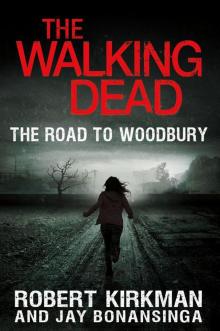 The Walking Dead: The Road to Woodbury
The Walking Dead: The Road to Woodbury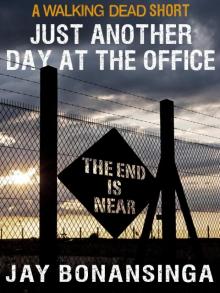 Just Another Day at the Office
Just Another Day at the Office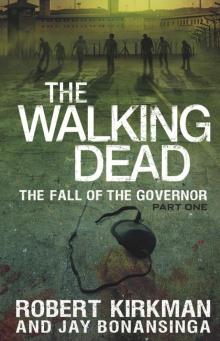 The Fall of the Governor: Part One
The Fall of the Governor: Part One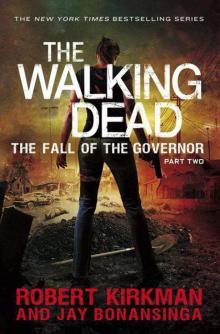 The Walking Dead: The Fall of the Governor: Part Two
The Walking Dead: The Fall of the Governor: Part Two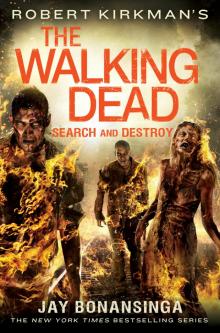 Search and Destroy
Search and Destroy Invasion
Invasion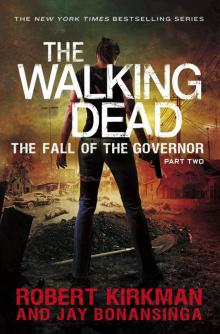 The Fall of the Governor: Part Two
The Fall of the Governor: Part Two The Walking Dead Collection
The Walking Dead Collection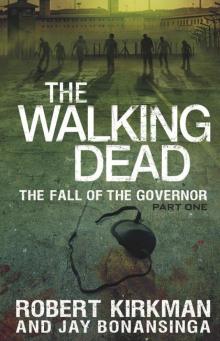 The Walking Dead
The Walking Dead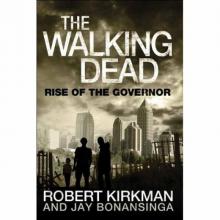 Descent
Descent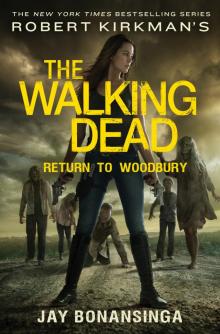 The Walking Dead: Return to Woodbury
The Walking Dead: Return to Woodbury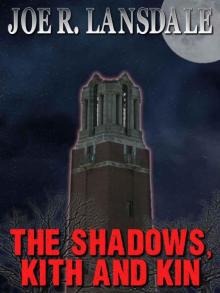 The Killer's Game
The Killer's Game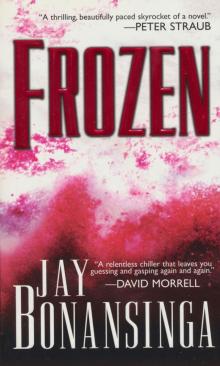 Frozen
Frozen Shattered
Shattered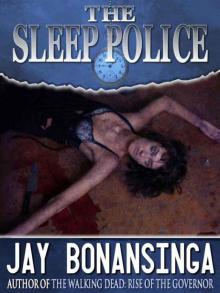 The Sleep Police
The Sleep Police Perfect Victim
Perfect Victim